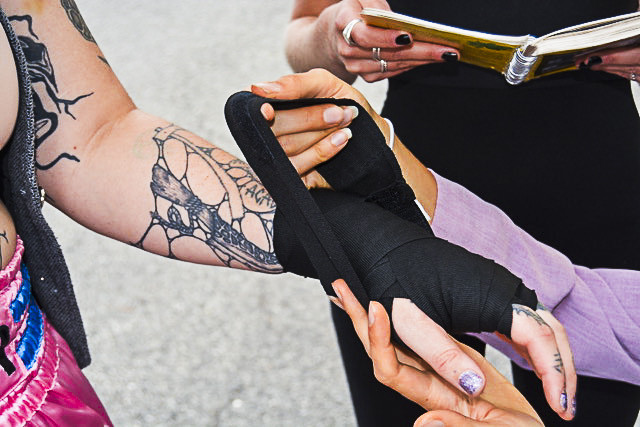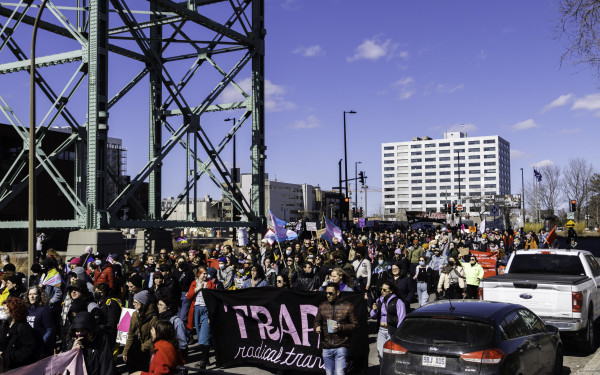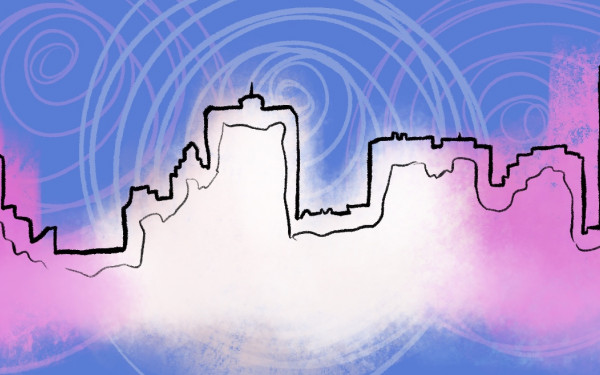Tackling gendered violence head-on
The Réseau d’autodéfense féministe’s fight for women and trans people’s safety
While teaching martial arts classes at Black Flag Combat Club, Woodie Choquette saw the need to build a program for gender-diverse people.
“We realized that there was a great demand from people living through gender-based violence.”
In response to the demand, Choquette and other volunteers created the Réseau d’autodéfense féministe (RAF), a program under the non-profit organization Inclusion Sport.
The program offers gender-diverse people an opportunity to apply self-defence in more realistic scenarios. “Martial arts did not always meet the need in which we could not implement the day-to-day life scenarios,” Choquette said.
According to Choquette, while there is a focus on learning to recognize potentially violent situations, the main purpose of the course revolves around breaking isolation around victims of violence. The RAF aims to provide a space for people to talk freely and without prejudice about violence. “It is to have places where we could talk about sexual violence and patriarchal violence with people who would have empathy and would not be embarrassed to talk about it,” they added.
The space is exclusive to trans, non-binary, two-spirited people and women from a large range of ages. The self-defence lessons are not only addressed to survivors of violence but to anyone who wants to learn how to protect themselves from any type of violence.
Transgender and gender-diverse people are 1.5 times more likely than cisgender people to have been physically or sexually assaulted since age 15, according to the Survey on Safety in Public and Private Spaces in 2018.
The basis of the program is to prevent scenarios of violence and to promote de-escalation. “It’s a lot of conversation about how to express boundaries, how to deal with catcalling..., how to notice violence within relationships with your intimate partners,” said Sphynx Crunch, a contributor to the curriculum of the self-defence courses.
These courses also aim to “help more people feel safe and comfortable, developing a sense of agency and feeling safe in their bodies,” she added.
The program offers the support and training necessary to fight back against any type of violence with physical, emotional, psychological, and verbal self-defence techniques, through a 12-hour program taught monthly by two to three coaches simultaneously. Spots are limited to 12 to 15 people. Each course is divided into three sections which include emotional, physical, and somatic techniques.
An essential part of the RAF relies on the coaches’ involvement in the program. Belant, who was granted anonymity upon request for safety reasons, became a coach after putting the program together with other volunteers. In her classes, she aims to validate any way participants use to defend themselves. “There aren’t good or bad ways to fight against violence,” she said. “They shouldn’t judge themselves and feel guilty for having acted differently.”
Another coach, Gauthier, also kept anonymous for their safety, makes sure everyone learns self-defence techniques that they are comfortable with using in real-life situations. After people practice, they go around to see which technique they prefer and help them learn to escape from different positions.
In contrast to Belant, Gauthier got involved after participating in the 12-hour program. People are encouraged and welcome to become part of the RAF after the courses, as having coaches from different backgrounds make all the difference. Some have experience in martial arts and others in feminist intervention, and their personal experiences with violence impact their approaches to teaching, according to Belant.
“The majority of us who aren’t cis men have experienced street harassment and experiences where our limits have been exceeded,” she said. “We shared our experiences that are rooted in us and what we’ve been through. We are all going to teach differently because of our different experiences.”
By the end of the program, people who have gone through gender-based violence will regain control over their lives and themselves through the RAF program. “I hope people will leave with a feeling of self-confidence, security and solidarity,” Choquette said.
In the long term, Choquette aspires to see structural changes in society through the program. “I hope we can reach a point where we bring social changes that eventually mean that people no longer have the responsibility of defending themselves against violence.”
But, the ultimate goal would be that “one day violence against people disappears.”
The RAF is in the first stage of its mission. They are working on future initiatives for the program, such as the creation of affinity or territorial communities of feminist self-defence, as well as a men’s group to facilitate discussion of gendered violence and the assumption of responsibility by men.
In addition, the RAF organizes different activities such as a reading club, screenings, and self-defence drop-in classes for sex workers. They announce their monthly activities on their social media platforms.
With the growing popularity of the RAF, they have been receiving demands from everywhere. “The demand keeps growing. We were asked to go to Quebec to train. We’ve also gotten requests from the Maritimes and Ontario,” Choquette said.
In Montreal, they are looking for a new space to welcome more people and provide an adequate area for their activities and courses.
Currently, the self-defence courses are at full capacity each month. People who want to participate in the program must register fast to secure a spot.
To register for their events and self-defence courses, visit the link in their Instagram or Facebook bio @reseau_autodefense_feministe. For more details, they can be reached directly by email at acces.autodefense@gmail.com.
This article originally appeared in Volume 44, Issue 13, published April 2, 2024.




_600_375_s_c1.png)


